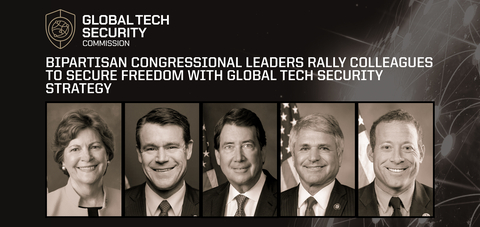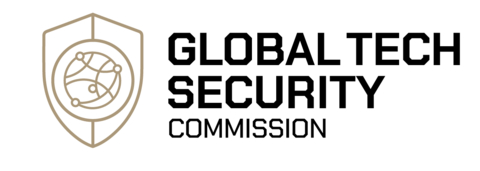Bipartisan Congressional Leaders Rally Colleagues to Secure Freedom with Global Tech Security Strategy
Bipartisan Congressional Leaders Rally Colleagues to Secure Freedom with Global Tech Security Strategy
Top Foreign Policy Lawmakers Unite Around Global Tech Security Commission
Senators Jeanne Shaheen (D-NH), Todd Young (R-IN), and Bill Hagerty (R-TN), as well as Representatives Michael McCaul (R-TX) and Josh Gottheimer (D-NJ) have issued a call to fellow Members of Congress to join the effort to develop a Global Tech Security Strategy to defend freedom against technological authoritarianism. (Graphic: Business Wire)
WASHINGTON--(BUSINESS WIRE)--A group of distinguished bipartisan leaders in foreign policy and national security, including Senators Jeanne Shaheen (D-NH), Todd Young (R-IN), and Bill Hagerty (R-TN), as well as Representatives Michael McCaul (R-TX) and Josh Gottheimer (D-NJ), serving as Honorary Co-Chairs of the Global Tech Security Commission, have issued a call to their fellow Members of Congress to join the effort to develop a Global Tech Security Strategy to defend freedom against technological authoritarianism.
In a “Dear Colleague” letter, the Honorary Co-Chairs of the Commission emphasized the critical importance of advancing a global tech security strategy in the face of mounting challenges from China to U.S. global leadership, security, and values. The Commission seeks to counter the rise of techno-authoritarianism by protecting shared democratic principles and liberties on which our nation and the free world are built. The Global Tech Security Commission was launched in response to the Congressional call for a thorough, bipartisan tech security playbook that would rally and unify like-minded countries, leverage the innovation and resources of the private sector, and build a global network to develop, protect and adopt trusted technologies.
Led by Co-Chairs Keith Krach, former U.S. Under Secretary of State and former CEO of DocuSign, and Kersti Kaljulaid, former President of Estonia and former Chair of the Three Seas Initiative, the International Commission is uniquely positioned to counter techno-authoritarian threats in three key ways.
First, its focus is on developing in-depth strategies for each White House-designated national security tech sector and integrating them into an overarching global tech security strategy. Second, global in scale and led by the private sector, the Commission is composed of 15 country commissioners, 12 tech sector commissioners and more than 20 strategy commissioners, who each lead expert advisory councils. Third, while previous commissions primarily focused on problem analysis and defensive policies, the Global Tech Security Commission will integrate offensive and defensive strategies and begin building the Global Tech Trust Network aimed at establishing standards to accelerate the adoption of trusted technologies.
“Both sides of the aisle recognize that the United States and the free world face ever-increasing technological threats from authoritarian regimes, such as Russia, China, Iran, and others," said Co-Chair Krach. "The bipartisan support for the Global Tech Security Commission conveys the urgency of its mission. The key to securing freedom is securing high tech with trusted technology. Failure is not an option.”
As the Commission continues to draft the Global Tech Security Strategy, the Honorary Co-Chairs urge their fellow Members of Congress to engage with the Commission and support its efforts to defend freedom from technological authoritarianism. Its operations are supported by the Krach Institute for Tech Diplomacy at Purdue and the Atlantic Council.
About the Global Tech Security Commission
The Global Tech Security Commission, consisting of international commissioners and multi-sector leaders, is committed to safeguarding freedom through the adoption of trusted technology. Its charter is to integrate comprehensive offensive and defensive strategies for the national security tech sectors into an overarching global tech security strategy. This mission aims to rally and unify like-minded countries, leverage private sector innovation by building a global tech trust network, and establish standards based on shared democratic principles.
For the Commission’s latest developments, visit globaltechsecurity.com. Please contact press@atlanticcouncil.org or techdiplomacy@prf.org for media inquiries about the Global Tech Security Commission.
About the Krach Institute for Tech Diplomacy at Purdue
Built on the nonpartisan principle that technology must advance freedom, the Krach Institute has rapidly become the world’s leading authority on Tech Diplomacy - the practice of integrating high-tech expertise, Silicon Valley strategies with foreign policy tools to accelerate the adoption of trusted technology. With Purdue's distinguished reputation as America's foremost national security university, the Institute leverages the university's cutting-edge innovation and global prominence in STEM education to execute result-oriented strategies.
For more information, visit www.techdiplomacy.org and follow on Twitter, LinkedIn, and YouTube.
About the Atlantic Council
Driven by our mission of “shaping the global future together,” the Atlantic Council is a nonpartisan organization that galvanizes U.S. leadership and engagement in the world, in partnership with allies and partners, to shape solutions to global challenges. The Atlantic Council’s Global China Hub researches and devises allied solutions to challenges posed by China.
Contacts
Krach Institute for Tech Diplomacy at Purdue
Email: techdiplomacy@prf.org
Atlantic Council press office
Email: press@atlanticcouncil.org

